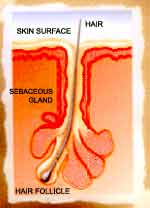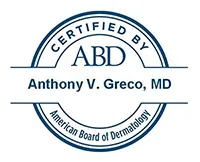What is acne?
 Acne is a disease. It's not caused by chocolate or french fries. Acne is primarily caused by oil (sebum) that comes from glands in your skin (sebaceous glands). These oil-producing glands are attached to every hair follicle on your body. The most active sebaceous glands are located on your face, back and chest. That's also where you get the most acne. Normally, the oil flows out of the sebaceous glands, up through the hair follicle and out of a pore on the skin's surface. Acne occurs when this path gets clogged and the oil can't reach the surface. Dead skin cells and sebum can clog the path. In addition, there is a type of bacteria called P. acnes that often infects clogged sebaceous glands. When this happens, pimples can occur.
Acne is a disease. It's not caused by chocolate or french fries. Acne is primarily caused by oil (sebum) that comes from glands in your skin (sebaceous glands). These oil-producing glands are attached to every hair follicle on your body. The most active sebaceous glands are located on your face, back and chest. That's also where you get the most acne. Normally, the oil flows out of the sebaceous glands, up through the hair follicle and out of a pore on the skin's surface. Acne occurs when this path gets clogged and the oil can't reach the surface. Dead skin cells and sebum can clog the path. In addition, there is a type of bacteria called P. acnes that often infects clogged sebaceous glands. When this happens, pimples can occur.
What is nodular acne?
You glands will continue to produce oil even when the pathway is clogged. This buildup of oil and dead cells may cause pimples to become large and painful.
Sometimes the infected sebaceous gland will burst and spread inflammation to nearby parts of the skin. The result may show up as a sore red lump called a nodule that may develop under the skin. This is called nodular acne, a condition which may result in scarring. If you think you have nodular acne, see a doctor right away. You may already have some scarring. The only way to avoid further scarring is by getting treatment.
What can you do to clear up your acne.
If you haven't been getting results from over-the-counter remedies like pads, creams or cleansers, it's time to consider seeing a doctor. Follow your doctor's instructions and advise your doctor if the prescribed treatments do not work to your satisfaction. The doctor may have additional treatment options. Fortunately, even the worst acne may be cleared up.
Female Acne
Hormones cause the sebaceous glands to grow and product more sebum during puberty. Since acne appears during adolescence when appearance is so critical, it may trigger feelings of anxiety and low self-esteem. The good news is that with a doctor's help, almost every type of acne may be cleared up. And the sooner you see a doctor, the better. Especially if you want to avoid further scarring.
Premenstrual acne.
It's common for many young women to experience acne during their menstrual cycle. Usually there is an increase in acne pimples one week before menstruation. These pimples appear quickly, and are thought to be associated with hormonal changes caused by ovulation. Not surprisingly, many women continue to get this type of acne in their adult years.
You should see a doctor if over-the-counter products can't clear up this type of acne.
Cosmetic acne.
This type of acne is caused by the use of certain cosmetics and toiletries including makeup, foundation, night creams, cleansers and moisturizers. These products often contain mineral oil or petroleum jelly that can clog pores and lead to acne. Such products are called "comedogenic." Try to look for "noncomedogenic" products to avoid this problem.
Cosmetic acne is usually minor and may not cause scarring. It consists mainly of pimples, and almost never leads to severe acne. However, cosmetic acne can be persistent, sometimes lasting for decades.
Overwashing with soaps, comedogenic products, rubbing and friction from clothing or hair can also make your acne worse. Your doctor can best identify and treat these types of acne.
Acne Treatments
There are three basic ways to treat acne:
- Reduce oiliness of the skin.
- Remove dead skin cells so they don't clog pores.
- Kill the bacteria that may cause infection.
A number of products are designed to treat acne: cleaning formulas, gels, pads, creams, lotions, Many of them are available at your pharmacy without a prescription. You may even have tried one or two and been disappointed with the results, Unfortunately, this happens frequently.
There are also topical and oral medications that require a prescription. But that means you need to see a doctor first. Your acne may be treated successfully... and, with a doctor's help, usually it will be.
